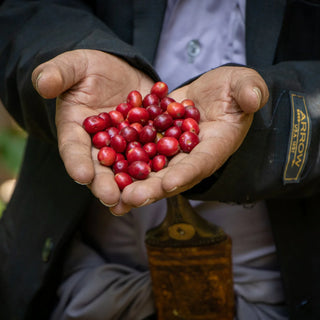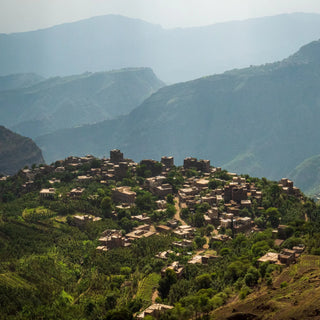



"Al Yemenia" coffee is from Asia, with a main focus on Yemeni coffee.
Asian coffees are generally quite earthy and chocolaty, so if you like this profile, this type of coffee is for you.
We will change the coffee approximately every 3 months, but the general profile will remain the same in all our Yemenia coffees.

Tropical and complex


"Al Yemenia" coffee is from Asia, with a main focus on Yemeni coffee.
Asian coffees are generally quite earthy and chocolaty, so if you like this profile, this type of coffee is for you.
We will change the coffee approximately every 3 months, but the general profile will remain the same in all our Yemenia coffees.

Tropical and complex

Process: Alchemy
The culmination of years of processing experience and more than 1,300 processing experiments, the Qima Alchemy Series represents the next generation of coffee processing innovation. It seeks to add sensorial value to coffees through applying innovative processing methods to enhance and embolden the coffees' cup profile, whilst maintaining the intrinsic flavours and notes that represent the terroir and the genetic background of the coffee. The Alchemy series relies on a combination of pressure (up to 10 bar/145 psi), temperature control, gas regulation and managed drying, to develop a truly unique set of coffees with unparalleled flavour expression and structure. All of the processing and fermentation protocols are underpinned by principles of chemical engineering, ensuring our innovations are both sensiorally unique and scientifically novel.

Variety: Yemenia
Yemenia is a new mother population within the species of Coffea arabica that is found exclusively in Yemen, and represents an ocean of unexplored genetics and future varieties that have the potential to reshape the world of arabica for centuries to come.

Region: Hayma Dakhiliya
Hayma Dakhiliya is a coffee-growing region located in the west of the Sana’a governorate and is one of the governorate’s most well-known regions. The region has 11 mountainous villages located 50 km west of the capital city of Sana’a. Some of these include Al Yaer, Bait Yaseen, Al Mezb and Bait Al Kabsh. However, due to rough terrain and rugged roads, these villages are hard to reach and remain isolated from the city. Access to education, healthcare, and other amenities also remains limited due to the same reason.
The Sana’a governorate occupies the biggest share of Yemeni specialty coffee production in quality and quantity. The main coffee-growing areas are Hayma Dakhiliya, Hayma Khariijya, Bani Matar, Bani Ismail, and Haraaz. Some factors that make high-quality coffee growing possible here include a range of altitudes, soil fertility, microclimate, and rainfall.
Sana’a is also home to Yemen’s capital city, which has one of the longest-continuous coffee cultures in the world. Much of the coffee consumed there is prepared using the traditional Ibrik method, brewing coffee in a copper or silver pot over hot charcoal.

Country: Yemen
While many coffee enthusiasts know Yemen as the birthplace of coffee, few realize its vital role in shaping the genetics of Coffea arabica worldwide. Over 98% of cultivated arabica varieties trace their origins to Yemen. Arabica, originally found in Ethiopia's forests, was brought to Yemen over 600 years ago, where it was domesticated and adapted to the arid mountains. Over centuries, the genetics of Yemeni coffee evolved, becoming distinct from their Ethiopian ancestors. These Yemeni trees eventually became the "mother" trees for nearly all modern cultivated varieties.



